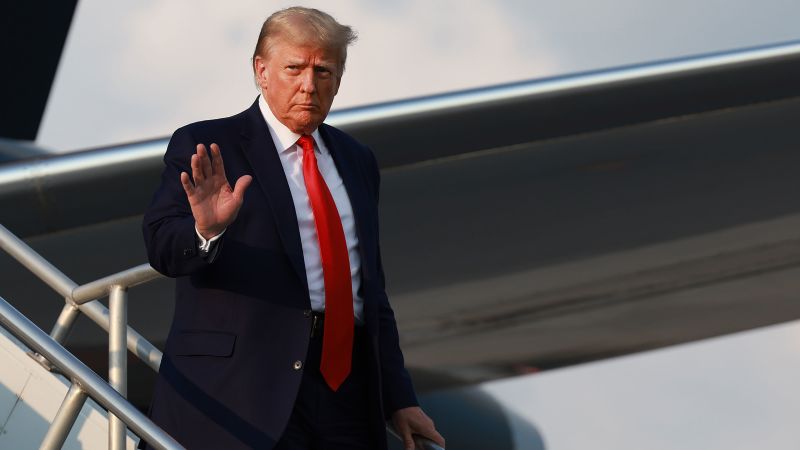CNN: Why Trump’s GOP rivals are hesitant to attack him
Polls show Donald Trump leading Florida Gov. Ron DeSantis, his nearest rival for the 2024 Republican presidential nomination, by about 40 points. You might think this would cause the former president’s GOP rivals to attack him in an attempt to eat into that support, which stands at north of 50% of the primary vote.
Yet, most of his opponents seem hesitant, if not totally unwilling, to do so.
A look at the numbers reveals why. Those who have gone after him have seen their popularity among Republican voters suffer, while those who have risen in primary polling are either mostly not mentioning Trump or are praising him.
The consequences of criticizing Trump
You needn’t look further than former New Jersey Gov. Chris Christie to understand what happens when a Republican candidate is highly critical of the former president. Christie is setting records for intraparty unpopularity. His net favorability rating in the latest Quinnipiac University poll stands at minus-44 points among Republicans. An astounding 61% of Republican voters hold an unfavorable view of him.
Indeed, Christie has, if anything, become more unpopular as the presidential campaign has gone on. From what I can tell, he appears to have the lowest net favorability rating at this point in the cycle of any Republican running for president since at least 1980.
The limited support for anti-Trump candidates
This doesn’t mean that Christie does not have a base of support within the GOP. A New York Times/Siena College poll from July illustrates the point well. The former New Jersey governor led the Republican field (with 22%) among likely GOP primary voters who cast ballots for Joe Biden in 2020. The problem is this group makes up less than 10% of the Republican primary electorate. Christie earned only about 1% support among the remaining 90-something percent.
Christie’s not alone in his poor favorability ratings among Republican presidential candidates seen as anti-Trump. Former Arkansas Gov. Asa Hutchinson and former Texas Rep. Will Hurd also face similar challenges.
The dilemma facing anti-Trump candidates
Other polling data confirms the dilemma facing Christie, Hutchinson, and Hurd. Beyond the fact that Trump is consistently viewed favorably by about 80% of his party – and as “strongly favorable” by more than 50% – most Republicans simply don
The Surprising Reason Trump’s Republican Rivals Avoid Attacking Him
In the realm of American politics, it is not uncommon for candidates to engage in fierce debates and launch scathing attacks against their opponents. However, one notable exception to this trend has been observed during Donald Trump’s tenure as the Republican Party’s presidential nominee and subsequently as the President of the United States. Trump’s Republican rivals have consistently avoided launching direct and aggressive attacks against him, leaving many political pundits and observers perplexed. This article aims to shed light on the surprising reason behind this phenomenon.
One plausible explanation for the reluctance of Trump’s Republican rivals to attack him lies in the unique political landscape that he has created. Trump’s unorthodox and unconventional approach to politics has effectively reshaped the Republican Party, garnering him a fiercely loyal base of supporters. By tapping into the frustrations and grievances of a significant portion of the American population, Trump has managed to cultivate a strong and passionate following that transcends traditional party lines.
This unprecedented level of support has created a challenging environment for Trump’s Republican rivals. Attacking him directly would not only risk alienating his loyal base but also potentially damage their own political careers. Trump’s supporters have demonstrated an unwavering commitment to their chosen leader, often dismissing any criticism as biased or unfounded. Consequently, any Republican candidate who dares to challenge Trump risks being labeled as a traitor to the party and losing the support of a significant voting bloc.
Furthermore, Trump’s unique communication style and ability to dominate media attention have made it exceedingly difficult for his rivals to effectively counter his narrative. Trump’s mastery of social media platforms, particularly Twitter, has allowed him to bypass traditional media channels and communicate directly with his supporters. This direct line of communication has enabled him to shape the narrative surrounding his presidency and control the public discourse to a remarkable extent.
Trump’s rivals have witnessed firsthand the consequences of engaging in direct confrontations with him. During the 2016 Republican primary, candidates who attempted to attack Trump head-on often found themselves on the receiving end of his relentless counterattacks. Trump’s skillful use of derogatory nicknames and personal insults effectively neutralized his opponents, leaving them struggling to regain their footing. This experience has undoubtedly left a lasting impression on Trump’s Republican rivals, dissuading them from engaging in similar confrontations in the future.
Another factor that contributes to the reluctance of Trump’s Republican rivals to attack him is the fear of alienating the broader Republican voter base. Despite the controversies and divisive rhetoric that have characterized Trump’s presidency, he has managed to maintain a high approval rating among Republican voters. This unwavering support from the party’s base has created a significant barrier for any Republican candidate seeking to challenge Trump’s authority.
In conclusion, the surprising reason behind Trump’s Republican rivals’ avoidance of direct attacks lies in the unique political landscape he has created. Trump’s ability to cultivate a fiercely loyal base, his mastery of media manipulation, and the fear of alienating Republican voters have all contributed to the reluctance of his rivals to engage in direct confrontations. As the 2024 presidential election approaches, it remains to be seen whether this trend will continue or if a new generation of Republican candidates will emerge with the courage to challenge Trump’s dominance within the party.








